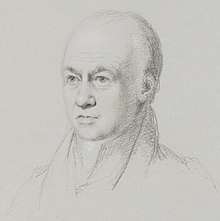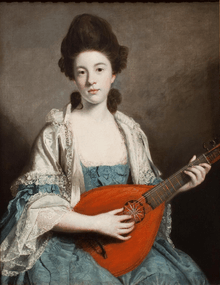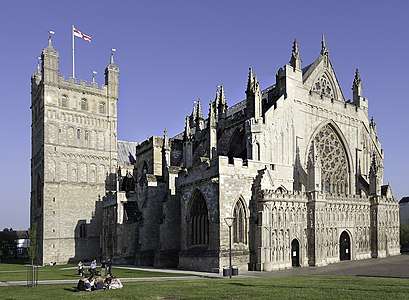Robert Froude
Robert Hurrell Froude (1771–1859) was Archdeacon of Totnes, in Devon,[1] from 1820 to 1859.[2] From 1799 to his death he was Rector of Denbury and of Dartington, both in Devon.[3]


Origins
He was born at Wakeham Farm[4] in the parish of Aveton Gifford near Modbury in Devon, the posthumous son of Robert Froude (1741–1770) of Modbury,[5] by his wife Phillis Hurrell (1746-1826) of Aveton Gifford,[5] whose portrait was painted by Sir Joshua Reynolds in 1762, four years before her marriage.[6] The Froude family is first recorded in surviving records at Kingston, South Hams, Devon, in the 16th century.[7] Robert Froude (1741-1770) was the third son of John Froude, from whom he inherited the estates of Edmeston and Gutsford, both in the parish of Modbury in Devon. He was the patron of Molland-cum-Knowstone in Devon in 1767, and was buried at Aveton Gifford in Devon.[7] Phillis Hurrell (1746-1826) was a daughter of Richard Hurrell, Gentleman, of Modbury, by his wife Phillis Collings, whom he married in 1746.[7] In 1767 Robert Froude, as patron, appointed John Froude I as Vicar of Molland-cum-Knowstone,[8] who was followed in 1804 by his son Rev John Froude II (1777-1852), Vicar of Molland-cum-Knowstone, an extreme example of the "hunting parson".
Career
He matriculated at Oriel College, Oxford in 1788, and obtained his M.A. in 1795. He was rector of Denbury when he assumed his new parish at Dartington in 1799.[9]
His marriage to Margaret Spedding produced eight children,[10] who included Richard Hurrell Froude who was involved in the formation of the Oxford Movement;[11] the railway engineer William Froude[12] and the historian James Anthony Froude.[13] A graduate of Oriel College, Oxford,[14] he was, for many years, the Rector of Dartington .[15] and Denbury.[16] He died on 16 February 1859.[17]
References
- Richardson 2013, p. 194.
- Wright 1889.
- Rintoul 1993, p. 429.
- "Church and chapels In Aveton Gifford". ag-project.co.uk. Retrieved 25 October 2019.
- Burgoyne 2017.
- "Mrs. Robert Froude, née Phillis Hurrell (1746-1826), Sir Joshua Reynolds". Minneapolis Institute of Art. Retrieved 25 October 2019.
- Brown 2006, p. 11.
- Per list of vicars displayed in Knowstone Church
- Guiney 1904, p. 420.
- Brown 2006, p. 10.
- Froude 1838.
- Simmons & Biddle 1997, p. 47.
- Markus 2005.
- Foster 1888, p. 498.
- "Richard Hurrell Froude", The Catholic Literature Association, London, 1933 – via Project Canterbury
- "DIOCESAN". The Royal Cornwall Gazette, Falmouth Packet, and General Advertiser (2905). Truro, England. February 25, 1859. p. 8 – via British Library Newspapers, Part II: 1800-1900.
- "Births, Deaths, Marriages and Obituaries". Trewman's Exeter Flying Post or Plymouth and Cornish Advertiser (4846). Exeter, England. February 24, 1859 – via British Library Newspapers, Part I: 1800-1900.
Sources
- Brown, David K. (2006). The Way of a Ship in the Midst of the Sea: The Life and Work of William Froude. Periscope. ISBN 978-1-904381-40-2.CS1 maint: ref=harv (link)
- Burgoyne, Chris (21 October 2017). "AG Parish Registers Master Index". www-civ.eng.cam.ac.uk. Retrieved 25 October 2019.CS1 maint: ref=harv (link)
- Foster, J., ed. (1888). Alumni Oxonienses: the members of the University of Oxford, 1715-1886; their parentage, birthplace and year of birth, with a record of their degrees. Being the matriculation register of the University. Vol II. Oxford: Parker & Co.CS1 maint: ref=harv (link)
- Froude, Richard Hurrell (1838). Remains of the Late Reverend Richard Hurrell Froude. J. G. and F. Rivington.CS1 maint: ref=harv (link)
- Guiney, Louise Imogen (1904). Hurrell Froude: memoranda and comments. Methuen & Co. p. 420.CS1 maint: ref=harv (link)
- Markus, Julia (2005). J. Anthony Froude: The Last Undiscovered Great Victorian : a Biography. Scribner. ISBN 978-0-7432-4555-5.CS1 maint: ref=harv (link)
- Richardson, Edmund (2013). Classical Victorians: Scholars, Scoundrels and Generals in Pursuit of Antiquity. Cambridge University Press. ISBN 978-1-107-02677-3.CS1 maint: ref=harv (link)
- Rintoul, M.C. (1993). Dictionary of Real People and Places in Fiction. Routledge. ISBN 978-1-136-11932-3.CS1 maint: ref=harv (link)
- Simmons, Jack; Biddle, Gordon (1997). "Bridges and Viaducts". The Oxford Companion to British Railway History from 1603 to the 1990s. Oxford University Press. ISBN 978-0-19-211697-0.CS1 maint: ref=harv (link)
- Wright, William Henry Kearley, ed. (1889). Some Account of the Barony and Town of Okehampton: Its Antiquities and Institutions: Including the Journals Kept by Messrs. Rattenbury and Shebbeare, Gents. and Burgesses, from the 21 James I., to the Death of William III.; with Notes Genealogical, Descriptive, and Explanatory. W. Masland.CS1 maint: ref=harv (link)
| Church of England titles | ||
|---|---|---|
| Preceded by Ralph Barnes |
Archdeacon of Totnes 1820–1859 |
Succeeded by John Downall |
